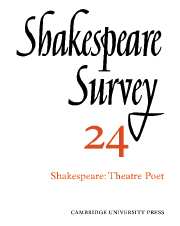Book contents
- Frontmatter
- Hearing Shakespeare: Sound and Meaning in ‘Antony and Cleopatra’
- ‘More Pregnantly Than Words’: Some Uses and Limitations of Visual Symbolism
- Shakespeare and the Limits of Language
- Revenge, Retribution, and Reconciliation
- Shakespeare the Professional
- Shakespeare’s Talking Animals
- The Morality of ‘Love’s Labour’s Lost’
- Shakespeare’s ‘Earth-treading Stars’: the Image of the Masque in ‘Romeo and Juliet’
- ‘Hamlet’ and the ‘Sparing Discoverie’
- ‘Hamlet’ in France 200 Years Ago
- The Hamlet in Henry Adams
- ‘Pericles’ and the Dream of Immortality
- A Necessary Theatre: The Royal Shakespeare Season 1970 Reviewed
- Free Shakespeare
- The Year's Contributions to Shakespearian Study 1 Critical Studies
- 2 Shakespeare’s Life, Times, and Stage
- 3 Textual Studies
- Index
- Plate section
Shakespeare the Professional
Published online by Cambridge University Press: 28 March 2007
- Frontmatter
- Hearing Shakespeare: Sound and Meaning in ‘Antony and Cleopatra’
- ‘More Pregnantly Than Words’: Some Uses and Limitations of Visual Symbolism
- Shakespeare and the Limits of Language
- Revenge, Retribution, and Reconciliation
- Shakespeare the Professional
- Shakespeare’s Talking Animals
- The Morality of ‘Love’s Labour’s Lost’
- Shakespeare’s ‘Earth-treading Stars’: the Image of the Masque in ‘Romeo and Juliet’
- ‘Hamlet’ and the ‘Sparing Discoverie’
- ‘Hamlet’ in France 200 Years Ago
- The Hamlet in Henry Adams
- ‘Pericles’ and the Dream of Immortality
- A Necessary Theatre: The Royal Shakespeare Season 1970 Reviewed
- Free Shakespeare
- The Year's Contributions to Shakespearian Study 1 Critical Studies
- 2 Shakespeare’s Life, Times, and Stage
- 3 Textual Studies
- Index
- Plate section
Summary
A conference on the theme of Shakespeare, theatre poet, encourages the reiteration of commonplaces: and, if my argument is familiar, two sentences which, according to Boswell, were deleted from The Vicar of Wakefield, may serve as an apology. ‘When I was a young man, being anxious to distinguish myself, I was perpetually starting new propositions. But I soon gave this over, for I found that generally what was new was false.’
Shakespeare's greatness as a poet has never been in doubt in English-speaking countries; the critics and actors have always paid lip-service to his greatness as a dramatist. Yet it is only during the last hundred years that we have known enough about the conventions of the Elizabethan theatre to judge Shakespeare's technical competence. Early this century, Robert Bridges, reacting against Bradley, wrote his famous attack on Shakespeare's carelessness and incompetence. He had the excuse that Victorian productions, however brilliantly acted, were merely adaptations. This was brought home to me very forcibly by Sir Donald Wolfit's production of Cymbeline in which he made precisely the same cuts as Irving had done half a century earlier. As a result the last act was completely unintelligible to those who had not read the play. Memories of the Irving production seduced Bernard Shaw into rewriting the last act for a production at the Stratford Memorial Theatre; but when he re-read Shakespeare's fifth act he frankly confessed that it was better than his own.
- Type
- Chapter
- Information
- Shakespeare Survey , pp. 37 - 46Publisher: Cambridge University PressPrint publication year: 1971

